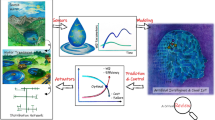Abstract
Water scarcity is a global concern due to population growth, climate change, and industrialization. Accurate water consumption simulation and forecasting are essential for understanding consumption patterns and predicting future demand. The control and visualization of how different aspects such as precipitation, season, and population affect water consumption can be a way for public agencies to plan actions that minimize waste and assist in the correct use of water. Technology, and especially Machine Learning and Digital Twin, can be used as tools for this. In light of this, this project aims to develop a system for simulating and forecasting water consumption in the Bragança region using a Digital Twin. In order to accomplish this, a comprehensive analysis is conducted to determine the necessary requirements for designing the system. This analysis encompasses the evaluation of hardware, software, data, machine learning models, web interface, as well as security and performance requirements. Furthermore, the architecture of this system and how it will be configured is analyzed, proposing a system with Training Data Sources, Training Process, Updated Data Sources, Digital Twin, Web Interface and Monitoring System. The system described in this article is under development and it is hoped to achieve as a result the full design of the Digital Twin and User Interface systems.
Access this chapter
Tax calculation will be finalised at checkout
Purchases are for personal use only
Similar content being viewed by others
References
Alves, R.G., Maia, R.F., Lima, F.: Development of a digital twin for smart farming: irrigation management system for water saving. J. Clean. Prod. 388, 135920 (2023)
Botín-Sanabria, D.M., Mihaita, A.S., Peimbert-García, R.E., Ramírez-Moreno, M.A., Ramírez-Mendoza, R.A., Lozoya-Santos, J.D.J.: Digital twin technology challenges and applications: a comprehensive review. Remote Sens. 14(6), 1335 (2022)
Cao, L., Yuan, X., Tian, F., Xu, H., Su, Z.: Forecasting of water consumption by integrating spatial and temporal characteristics of short-term water use in cities. Phys. Chem. Earth Parts A/B/C 130, 103390 (2023). https://doi.org/10.1016/j.pce.2023.103390. https://www.sciencedirect.com/science/article/pii/S1474706523000347
Cesco, S., Sambo, P., Borin, M., Basso, B., Orzes, G., Mazzetto, F.: Smart agriculture and digital twins: applications and challenges in a vision of sustainability. Eur. J. Agron. 146, 126809 (2023)
Fonseca, Í.A., Gaspar, H.M., de Mello, P.C., Sasaki, H.A.U.: A standards-based digital twin of an experiment with a scale model ship. Comput. Aided Des. 145, 103191 (2022)
Fuller, A., Fan, Z., Day, C., Barlow, C.: Digital twin: enabling technologies, challenges and open research. IEEE Access 8, 108952–108971 (2020)
Gubareva, R.: Extracting temporal patterns from smart city data. Master’s thesis (2022). https://bibliotecadigital.ipb.pt/handle/10198/25870. Accepted 02 Sept 2022
Kavya, M., Mathew, A., Shekar, P.R., P, S.: Short term water demand forecast modelling using artificial intelligence for smart water management. Sustain. Cities Soc. 95, 104610 (2023). https://doi.org/10.1016/j.scs.2023.104610. https://www.sciencedirect.com/science/article/pii/S2210670723002214
Liu, X., et al.: A systematic review of digital twin about physical entities, virtual models, twin data, and applications. Adv. Eng. Inform. 55, 101876 (2023)
Lu, Q., et al.: Developing a digital twin at building and city levels: case study of west Cambridge campus. J. Manag. Eng. 36(3), 05020004 (2020)
World Health Organization: State of the world’s drinking water: an urgent call to action to accelerate progress on ensuring safe drinking water for all (2022)
Pesantez, J.E., Alghamdi, F., Sabu, S., Mahinthakumar, G., Berglund, E.Z.: Using a digital twin to explore water infrastructure impacts during the covid-19 pandemic. Sustain. Urban Areas 77, 103520 (2022)
Tao, F., Xiao, B., Qi, Q., Cheng, J., Ji, P.: Digital twin modeling. J. Manuf. Syst. 64, 372–389 (2022)
Wolf, K., Dawson, R.J., Mills, J.P., Blythe, P., Morley, J.: Towards a digital twin for supporting multi-agency incident management in a smart city. Sci. Rep. 12(1), 16221 (2022)
Yeon, H., Eom, T., Jang, K., Yeo, J.: Dtumos, digital twin for large-scale urban mobility operating system. Sci. Rep. 13(1) (2023). https://doi.org/10.1038/s41598-023-32326-9. https://www.scopus.com/inward/record.uri?eid=2-s2.0-85151176448 &doi=10.1038%2fs41598-023-32326-9 &partnerID=40 &md5=a596bf448f95164776c3ee18d1f2182a. All Open Access, Gold Open Access, Green Open Access
Zekri, S., Jabeur, N., Gharrad, H.: Smart water management using intelligent digital twins. Comput. Inform. 41(1), 135–153 (2022)
Zhang, X., et al.: Real-time pipeline leak detection and localization using an attention-based LSTM approach. Process Saf. Environ. Prot. 174, 460–472 (2023). https://doi.org/10.1016/j.psep.2023.04.020. https://www.scopus.com/inward/record.uri?eid=2-s2.0-85152937802 &doi=10.1016%2fj.psep.2023.04.020 &partnerID=40 &md5=3ab0978b41f5b91613e529429b1c7bdd
Acknowledgments
This work has been supported by FCT - Fundação para a Ciência e Tecnologia within the Project Scope: DSAIPA/AI/0088/2020.
Author information
Authors and Affiliations
Corresponding author
Editor information
Editors and Affiliations
Rights and permissions
Copyright information
© 2024 The Author(s), under exclusive license to Springer Nature Switzerland AG
About this paper
Cite this paper
Galvão, M., Rici, P., Lopes, R.P. (2024). Digital Twin for Regional Water Consumption Simulation and Forecasting. In: Pereira, A.I., Mendes, A., Fernandes, F.P., Pacheco, M.F., Coelho, J.P., Lima, J. (eds) Optimization, Learning Algorithms and Applications. OL2A 2023. Communications in Computer and Information Science, vol 1981. Springer, Cham. https://doi.org/10.1007/978-3-031-53025-8_23
Download citation
DOI: https://doi.org/10.1007/978-3-031-53025-8_23
Published:
Publisher Name: Springer, Cham
Print ISBN: 978-3-031-53024-1
Online ISBN: 978-3-031-53025-8
eBook Packages: Computer ScienceComputer Science (R0)




